 Petzlover
Petzlover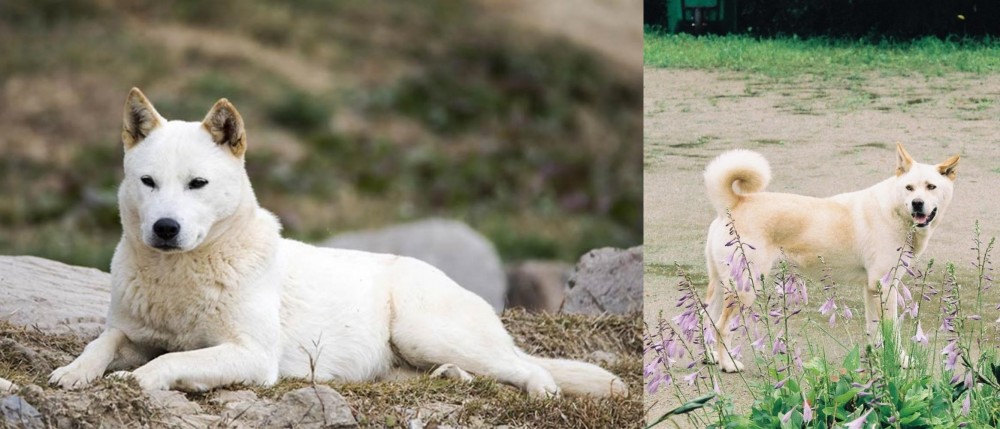 Jindo is originated from South Korea but Pungsan Dog is originated from North Korea. Both Jindo and Pungsan Dog are having almost same height. Both Jindo and Pungsan Dog are having almost same weight. Both Jindo and Pungsan Dog has same life span. Jindo may have more litter size than Pungsan Dog. Both Jindo and Pungsan Dog requires Moderate Maintenance.
Jindo is originated from South Korea but Pungsan Dog is originated from North Korea. Both Jindo and Pungsan Dog are having almost same height. Both Jindo and Pungsan Dog are having almost same weight. Both Jindo and Pungsan Dog has same life span. Jindo may have more litter size than Pungsan Dog. Both Jindo and Pungsan Dog requires Moderate Maintenance.
 Hailing from Korea, the Jindo dog's name is actually taken from the island Jindo. The dogs lived on the island for thousands of years, developing into a natural breed with good hunting skills.
Hailing from Korea, the Jindo dog's name is actually taken from the island Jindo. The dogs lived on the island for thousands of years, developing into a natural breed with good hunting skills.
They are also known as Jin Dog, Jindo-kae or Jindo-kyon. The exact origins of the Korean Jindo are unknown and it is believed to have been developed from different Mongolian breeds.
They were brought to the United States and been entered into the American Kennel Club.
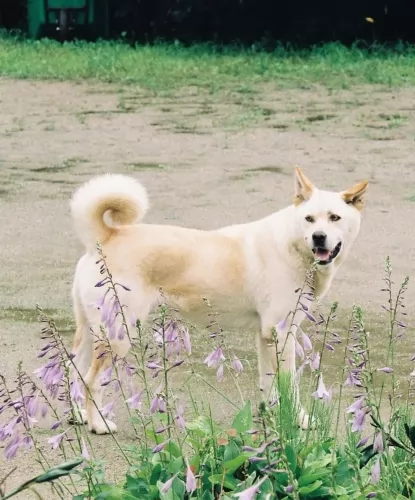 It is a hunting dog and considered to be a National Treasure of Korea. It was during the Japanese occupation of Korea that the dog’s thick coat was sought after for use in fur coats for the Japanese military.
It is a hunting dog and considered to be a National Treasure of Korea. It was during the Japanese occupation of Korea that the dog’s thick coat was sought after for use in fur coats for the Japanese military.
The population numbers plummeted dramatically, with the Korean War reducing the numbers even further. The North Korean government assisted with re-establishing them.
Today, the Pungsan isn’t recognized by the Federation Cynological International (FCI) and also remains unrecognized by any major kennel clubs.
 The Jindo is a medium sized spitz-type dog breed which is well-proportioned with erect ears and a long tail which is held over the dog's back.
The Jindo is a medium sized spitz-type dog breed which is well-proportioned with erect ears and a long tail which is held over the dog's back.
He stands at roughly 45 – 65cm and they weigh anything between 11 to 23kg. The coat of the dog is medium length and available in a number of colors – yellow, tan, red, white, brindle, black or bi-color such as black and tan.
When you look at the Jindo you get the impression of bright alertness and intelligence. He makes a great watchdog, and with his bright, alert eyes and upright ears, he just looks like he is on guard.
The Jindo has always been a hunting dog so he has learned to be bold, tenacious and alert. He is also brave, courageous, loving and loyal to his master, but you need to know that he is a dominant dog who will get on well with an owner who is fair, strong, patient, kind and firm.
These dogs are strong willed, independent and dominant as well as being intelligent. He will require socialization and training from an early age. Be fair, firm and consistent with your instructions which he will obey once he has been trained. With training he gets on well with children in the home but he is inclined to have some difficulty with accepting other dogs into the family.
As with any dog breed, the temperament of the Jindo will vary according to the environment he lives in and the type of owners he has. The typical Jindo is an affectionate dog with his human family, being a little bit reserved around strangers.
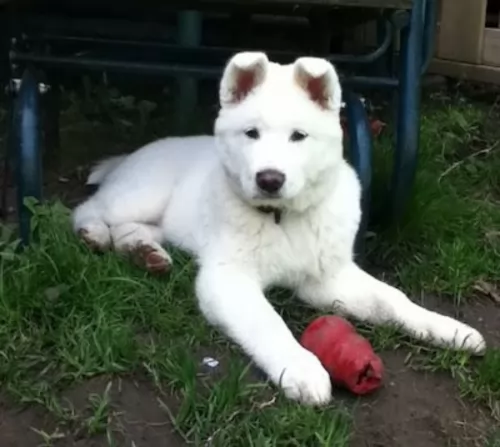 The Pungsan dog is a large dog – a kind of spitz-type dog which stands between 55 and 60cm in height and weighs between 18-24 kg.
The Pungsan dog is a large dog – a kind of spitz-type dog which stands between 55 and 60cm in height and weighs between 18-24 kg.
The dog has a thick whitish coat that even allows them to sleep in the snow. They have a muscular build with a deep chest. The legs are straight and strong, with the typical Spitz-type triangular head with the almond-shaped eyes and erect ears. The tail is high-set, curling over the back. After mating, within 60 – 70 days they can produce 2 to 4 puppies.
It it thought that the Pungsan’s intelligence is due to wolf DNA but there is a question mark over this. They are intelligent dogs though.
These dogs are always loyal and protective of their owners, forming strong bonds with them. They are strong-willed and independent and will require training and socialization if you want them to be obedient, well mannered dogs.
They’re intelligent so won’t have problems learning. When properly trained and socialized, they can be good playmates for children. He is also able to get along well with other animals in the house.
They’re aloof with strangers and have strong territorial instincts, but this just goes towards making them excellent watchdogs.
 The Jindo makes an awesome pet for owners who enjoy an active lifestyle. A happy, contented Jindo becomes a devoted, loyal pet who wants to guard and protect his owner from strangers, for whom he is wary and reserved.
The Jindo makes an awesome pet for owners who enjoy an active lifestyle. A happy, contented Jindo becomes a devoted, loyal pet who wants to guard and protect his owner from strangers, for whom he is wary and reserved.
He is an intelligent pet too, being easy to train and socialize and while independent, he loves to spend time with his human family and is an all-round excellent pet.
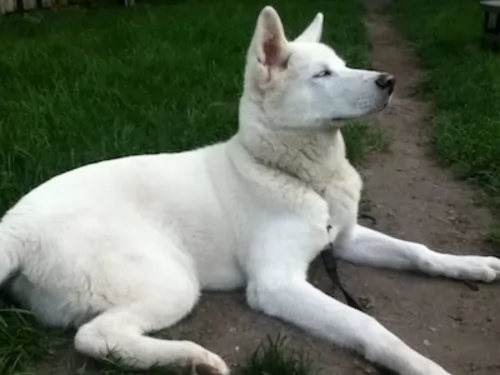 The Pungsan is a wonderful dog if you’re looking for an affectionate, loyal pet.
The Pungsan is a wonderful dog if you’re looking for an affectionate, loyal pet.
These dogs thrive on having an owner that is energetic and a strong leader. It likes to become involved in all the activities the family is involved in, loving to join them on hikes and camping trips. Its a dog that is also protective and territorial and makes a good watchdog too.
With proper training and socialization he gets on well with children and other pets in the home, making him a welcome canine family member for any busy household.
 The Korean Jindo dog is looked upon as a generally healthy dog breed with no serious genetic problems to talk about. Look out for eye diseases and dental decay as well as hypothyroidism, a common disease in dogs where you notice deterioration with the coat – thinning, dry and dull.
The Korean Jindo dog is looked upon as a generally healthy dog breed with no serious genetic problems to talk about. Look out for eye diseases and dental decay as well as hypothyroidism, a common disease in dogs where you notice deterioration with the coat – thinning, dry and dull.
The dog’s skin also becomes flaky and you’ll notice that your once energetic pet is now gaining weight and is lethargic. Get him to the vet. Hypothyroidism can be treated simply by your vet to get your pet healthy once again.
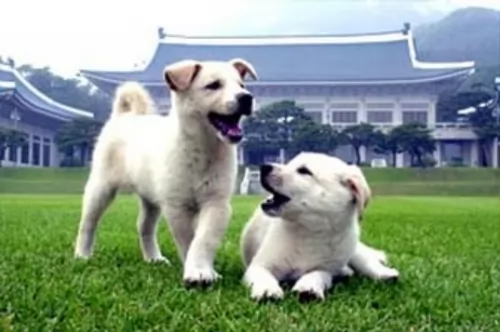 The Pungsan is a healthy breed prone to very few health issues, yet there will always be those common health issues that plague dogs like these. One of these is hip dysplasia, while others are obesity, bloat and cancer.
The Pungsan is a healthy breed prone to very few health issues, yet there will always be those common health issues that plague dogs like these. One of these is hip dysplasia, while others are obesity, bloat and cancer.
It can be very sad when your vet tells you that your dog has hip dysplasia. Fortunately with modern veterinary medicine, a dog can be kept happy with this ailment.
The hip joint doesn’t develop properly and painful wear and tear with arthritis makes it very difficult for the dog to be mobile. It’s a genetic condition but diet and environmental factors play a huge part too. Get your pet to the vet to ensure he is pain free.
Seizures in a dog can be caused usually because of trauma, tumor or infection. Seizures can start from as young as 6 months of age.Some seizures can last for a long time and are considered an emergency, requiring immediate veterinary help.Your veterinarian will want a complete history and perform a neurological exam.
 The Jindo has a double coat and this sheds heavily about twice a year, so certainly during these shedding periods you will need to brush his coat twice a week to keep it free from loose hair.
The Jindo has a double coat and this sheds heavily about twice a year, so certainly during these shedding periods you will need to brush his coat twice a week to keep it free from loose hair.
Never just assume that your dog is healthy and happy. When you brush him, check him over for ticks and fleas, check him for any unusual lumps, make sure his nose is wet and that his eyes are bright. Look at the condition of his fur, check his teeth and inside his ears – there are lots of tell-tale signs that can indicate that all is not well with your pet and then you need to get him to the vet.
As a medium-sized breed, if you feed your dog commercially manufactured food, he will require a high quality food that has been formulated for a dog of his size and his activity levels. Mix some home-made cooked chicken, brown rice or pasta as well as vegetables into his kibble and try to include some raw meat in occasionally too. He needs to always have access to fresh, clean water.
The Jindo is a high energy dog, and with his bright face you can tell that he is always ready for action. Long ago he was bred to perform hunting and retrieving type jobs, and with their stamina, they require having a busy day.
They certainly require a significant amount of exercise and mental stimulation, so you will need to include him in your daily walks and give him exciting ball games.
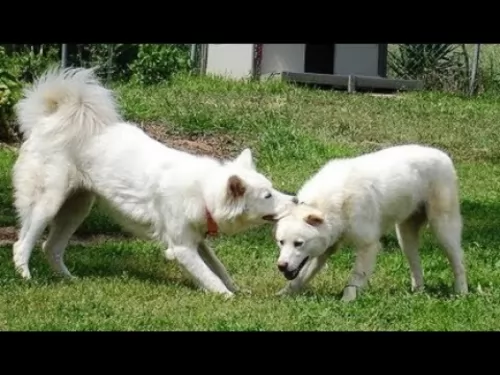 With his dense coat, this dog will require a brush twice a week to keep the fur free from matting and from loose hair. He is after all a fairly heavy shedder and will require this regular brushing to remove the dead hair and maintain the luster and sheen of the coat.
With his dense coat, this dog will require a brush twice a week to keep the fur free from matting and from loose hair. He is after all a fairly heavy shedder and will require this regular brushing to remove the dead hair and maintain the luster and sheen of the coat.
This is a strong, athletic dog and he is mentally sharp as well. He will require vigorous physical- and mental activity each day. He isn’t the kind of dog to lie around for long periods of time as this leads to frustration and destructive behavior and then the owner should be blamed.
Take him on walks or long hikes – he’ll love that – and play ball- and rope games with him. He will be quite game for swimming as well.
Your Pungsan dog can get to 14 years of age with good food. While you do get some excellent commercially manufactured dog foods, you want to be sure your pet gets some nutritious home-made food too.
Make sure that the kibble is the high quality ones with lots of vitamins and minerals. Add in some home-made food twice a week. Boiled chicken, brown rice or pasta and spinach, sweet potatoes and carrots are a healthy choice for your pet. Your dog will do well on plain, simple, nutritious, tasty food like this. Chop this food up and add it into the dry kibble a couple of times a week.
Some raw meat added in from time to time will help his skin and coat remain healthy. Never leave him without a constant source of fresh, cool water.